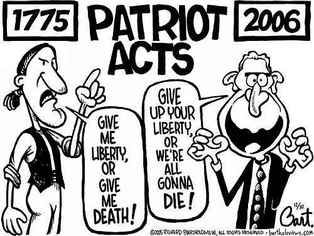The PATRIOT Act:
The PATRIOT Act is a piece of legislation that was passed by George W. Bush on October 26, 2001. The word PATRIOT is an acronym for Providing Appropriate Tools Required to Intercept and Obstruct Terrorism. The act was passed just two short months after the terrorist attacks of 9-11. The PATRIOT Act’s primary purpose was to grant law enforcement agencies access to methods of information gathering that had previously been heavily restricted.
Changes Implemented:
The PATRIOT Act's primary purpose was to enable government agencies to easily monitor civilians suspected of conspiring to commit acts of terror. Prior to its passing law enforcement agencies were required to obtain judicial authorization before tapping a civilian phone line. This requirement was historically considered to be a necessary implementation of the check and balance system outlined by the US Constitution. However, in the post 9-11 panic Congressional review of the usage of the information gathered under the protocol outlined by the PATRIOT Act shows that "warrantless searches in the name of national security have been seriously abused," (USA Patriot 107). The government's ability to freely eavesdrop and monitor civilian communication is common in many traditional dystopian societies. Perhaps the best example of government Patriot-Actesque monitoring comes from the novel 1984A TALE OF TWO DYSTOPIAS 1 , "it allowed the government to banish privacy by monitoring every word and deed over a massive network of wires,"(Fukuyama). Invoking peoples right to privacy is definitely another example of how this aspect of society became a dystopia.
The law explicitly authorized, or eased law enforcement agencies’ previously restricted access to:
-civilian telephones
-email
-medical records
-financial records
-library records
-civilian telephones
-medical records
-financial records
-library records

